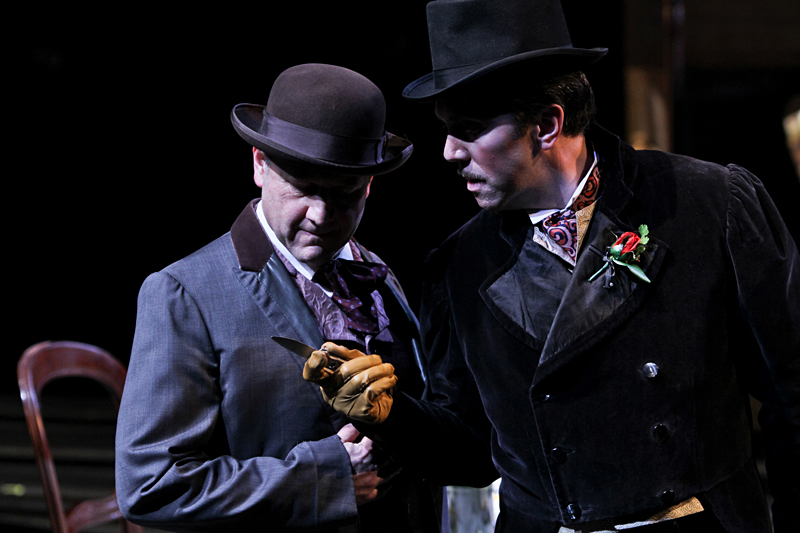When 18th-century playwright John Gay wanted to skewer the corruption of London society (not to mention its ridiculous obsession with Italian opera, which then dominated the stage), he wrote a comedy about thieves and whores, set it to some borrowed folk tunes, and called it The Beggar’s Opera. When Bertolt Brecht and Kurt Weill wanted to do the same to the corruption of Weimar Germany (not to mention the capitalist exploitation of workers), they adapted that into The Threepenny Opera, moving the setting to 1834. Later, leftist composer Marc Blitzstein translated it (back) into English and reworked it for an off-Broadway production (which spawned the pop hit “Mack the Knife”), the version used in the Seattle Shakespeare Company’s current staging.
So thank goodness artistic director Stephanie Shine takes a straightforward and non-overthought approach to this Russian nesting doll of a show. Except for a brief and highly effective framing device, a prologue and epilogue set in a sort of Cabaret-ish nightclub, the rest of the piece stays strictly in period. And she doesn’t push the satiric subtext to the surface, trusting the audience to figure out how Brecht/Blitzstein’s wisecracks about banks and the Bible still apply today.
Also gratifyingly underplaying is John Bogar as chief thief Macheath, who with his swept-back hair and eyebrow-pencil mustache looks a lot like Christopher Walken as The Continental. Others might have given the character a nastier edge—and tipped his imminent execution, at the show’s climax, from affecting to deserved. I prefer a Macheath whom we’re actually sorry to see go. The loose plot involves his marriage to Polly Peachum (Allison Standley), whose family has made an unclean fortune selling panhandlers begging licenses and all the necessary accessories. In Brecht’s ironic world, not only are the beggars who do an honest day’s work manipulated by the bourgeoisie; even gentleman criminals like Macheath are having their livelihoods threatened by the Industrial Revolution.
Full of verve and richly theatrical, this production is, as it happens, the first musical Seattle Shakes has attempted in its 20 seasons. From the very opening, when Weill’s vinegary overture, with all its faux-Handelian counterpoint, is sung by the ensemble, it’s clear Shine and her company have a real imaginative flair for them. (I bet they could do some innovative and keen-edged Gilbert and Sullivan, for one thing.) Between the 5th Avenue and touring shows, Seattle gets a lot of big, splashy musicals; but as this staging demonstrates, so much good stuff can also be done with just a black-box space, a piano, and a fresh eye.







